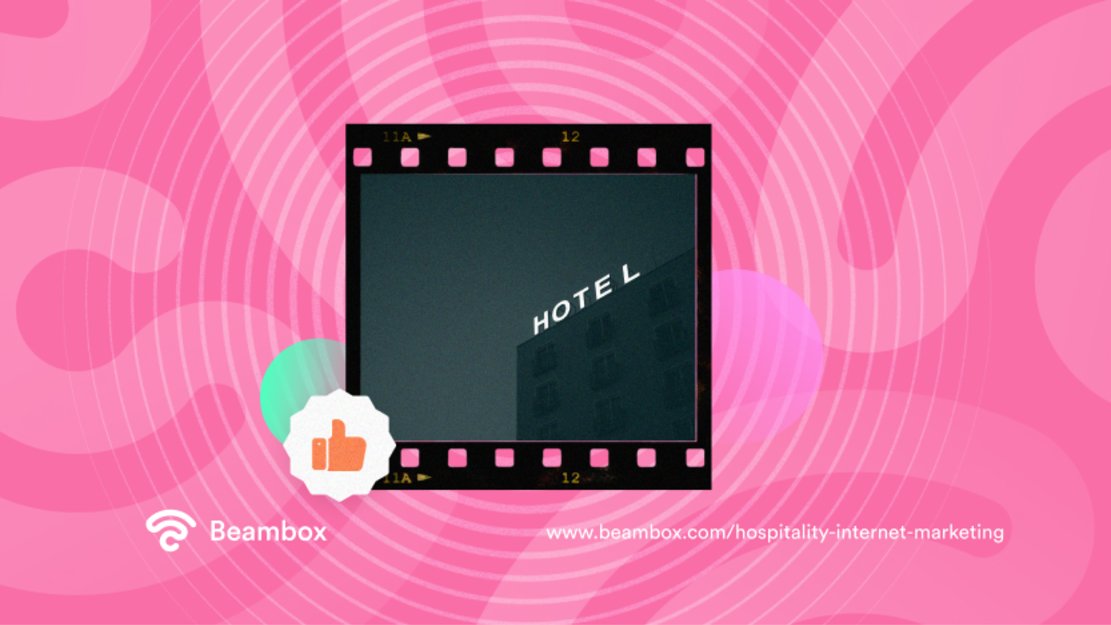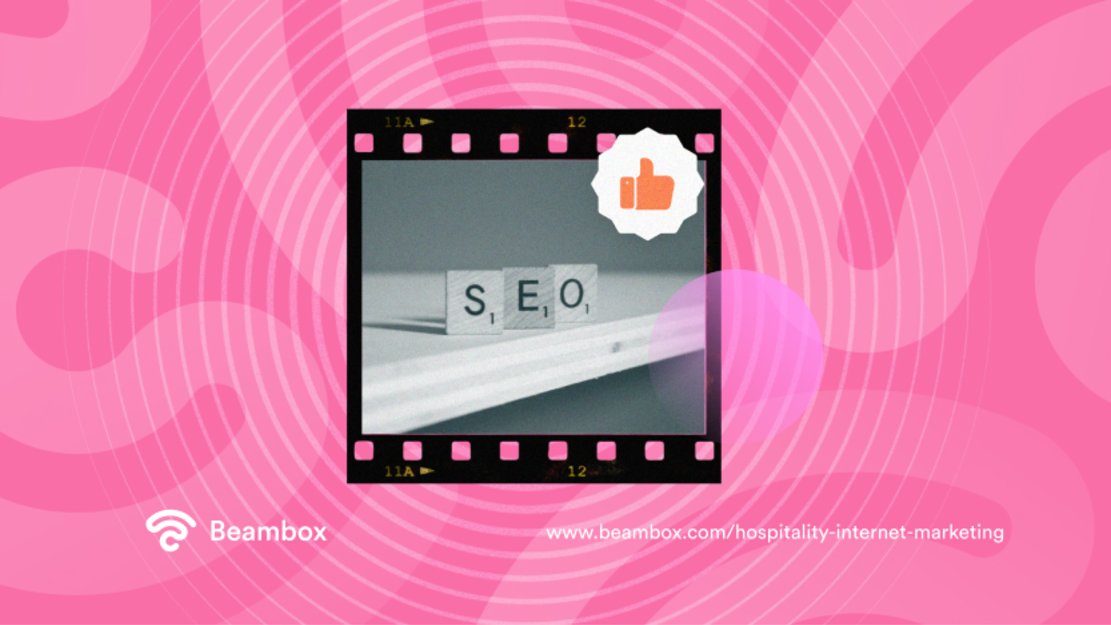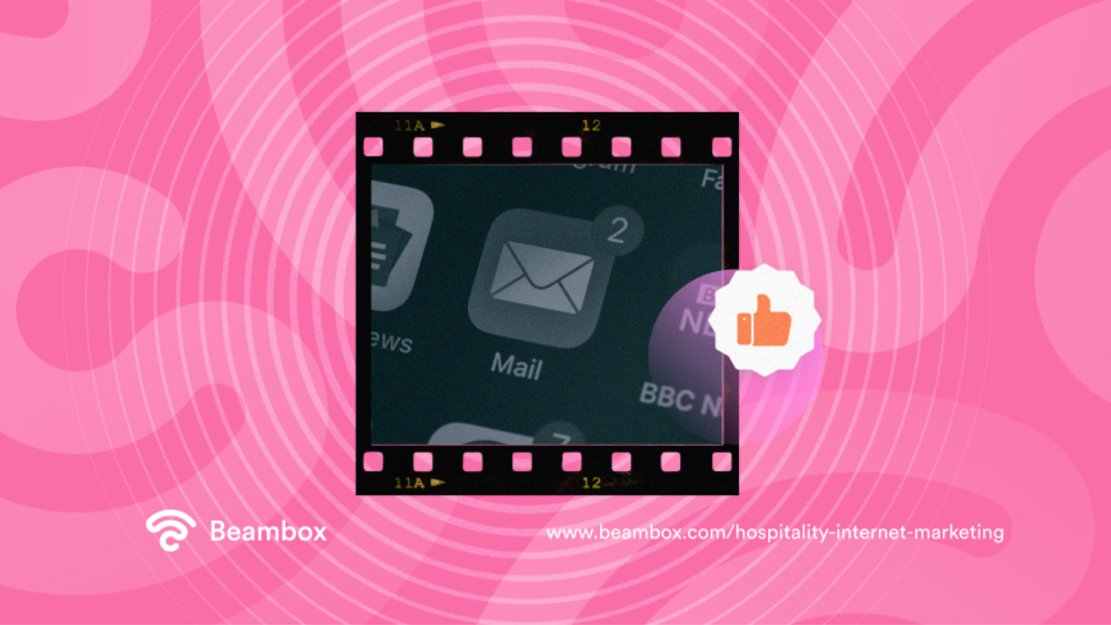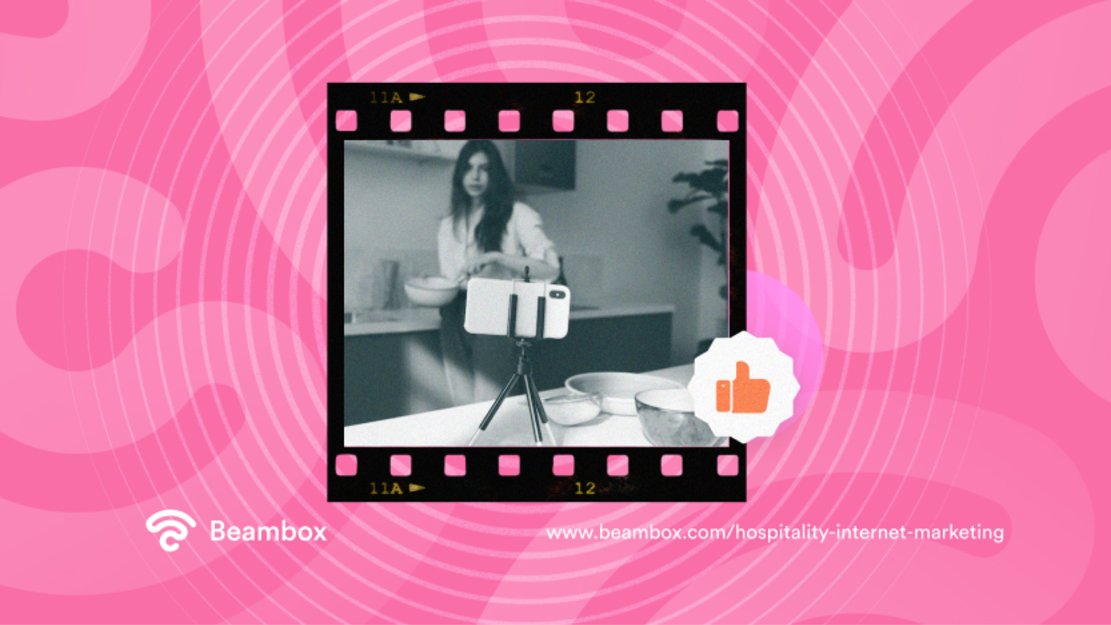Although businesses in the hospitality industry are often physical spaces, relying solely on local marketing would be a poor choice. Using local marketing and hospitality internet marketing is your best move.
People have started turning to the internet to search for hotels and restaurants to visit.
Furthermore, building trust and brand awareness isn’t possible without a strong online presence these days. This type of marketing might sound new to your ears, but you’re probably already familiar with the concept, unknowingly. It falls under the umbrella of digital marketing, which can bring crowds of guests when you use the right strategies.
So, let’s dive right in and unpack everything you need to know about how internet marketing benefits the hospitality industry.

The Difference Between Hospitality Internet Marketing and Digital Marketing
While we mentioned that hospitality internet marketing falls under digital marketing, they somewhat differ.
Digital marketing includes all marketing efforts that use electronic devices or the internet. Social media marketing, SMS marketing, digital display advertising, etc., are all part of it.
On the other hand, digital marketing strategies that cannot work without the Internet fall under Internet marketing. Email marketing, influencer marketing, and search engine optimization are just some names on this list.
However, when deciding your promotions, you should think of your customers and not the medium. For example, TV ads are mostly digital and don’t require the internet to reach your audience.
It’s true that your target audience is searching for you on the internet. But would it hurt to get some traffic from other digital means? Plus, the hospitality industry isn’t just for the new generation.
The older generation is more active on traditional marketing channels like TV, radio, and SMS. So that’s where you should target them.
Both the newer and older marketing channels are cost-effective. There are two reasons for this advantage.
Firstly, they’re generally less costly than traditional methods such as billboards.
Secondly, they’re more flexible, and you have more room to personalize your messages. Since they zero in on your customers’ preferences, they work better when it comes to conversions. This massive return on investment (ROI) makes these strategies every marketer’s favorite.
Furthermore, there are tools you can use to measure the effectiveness of such marketing campaigns. Improving your efforts and changing tactics becomes easy this way.
6 Internet Marketing Strategies To Fill Your Venue With Guests
Are you familiar with the fact that hotels using digital marketing get 70% more bookings than the ones that don’t? If the above discussion didn’t succeed at piquing your interest in internet marketing, this statistic probably has.
However, with the abundance of tactics out there, it’s only natural to feel overwhelmed. While the same strategy won’t work for each type of marketing, the main theatrics will remain the same. And that’s exactly what we’re here to guide you through with these six internet marketing strategies.

1. Use Search Engine Optimization To Appear on Google Search Results
Your internet marketing strategy cannot be complete without search engine optimization (SEO). After all, Google is the first place people search for answers regarding their restaurant and hotel queries.
It’s a fight for the best spot in these search results. The further down you go, the less online traffic you’re likely to get to your website.
However, of course, they won’t just choose the first result they find either. They’ll do their due diligence by checking your reviews and seeing if your offers match their preferences.
But to get a chance to go through these filters, you must have good SEO that makes Google favor your business. In return, ranking high on Google makes people trust and choose you.
Therefore, create a Google Business (previously called Google My Business) profile and list your business on review sites. A good reputation on these platforms will help you win over potential customers.
But there are three more aspects of SEO that you must pay attention to.
Firstly, there’s on-page SEO. It requires you to fill your website with content that helps Google associate your business with the search query. Contrary to popular belief, it’s more than just stuffing your content with keywords.
It’s about answering people’s questions and matching their search intent. The more time people spend on your website and engage with your content, the higher you’ll rank in Google’s search results.
Next, there’s off-page SEO, where you have to acquire backlinks to create authority. This is a result of networking, guest posting, etc. Remember to do keyword research with this one.
The last part is technical SEO, which deals with the code of the website. Structured data, file optimization, etc., are parts of this.
You could also just pay Google to put you in the first place with pay-per-click (PPC) advertising. This method is the easiest way to reach one billion people.
Pay-per-click advertising is also a part of internet marketing for hospitality businesses. Here, the platform pushes your ad in front of more people instead of just showing it to your followers. Therefore, they have more reach than the usual means of marketing on social media.
As mentioned earlier, you can do the same thing on Google as well. Each time a person clicks on your ads, the platform charges you a certain amount. On search engines, it’s all about the content. But that’s not the only way to use PPC advertising to your advantage.
Firstly, you can place video ads on YouTube. Here, you only have a few seconds to grab the viewer’s attention. If the start doesn’t blow their mind, they’ll most probably skip the ad and forget all about it. From the words to the visuals, everything should spark their interest.
Secondly, Facebook and Instagram are popular platforms for image ads. Again, they should be able to stop the viewer in their tracks, or rather in their scrolls. You’ve already lost potential customers if they don’t read or view the full ad.
Lastly, Twitter and LinkedIn also give you a chance to reach a wider audience through sponsored content.
Even if you’re not placing ads, just participating in social media marketing would be enough.
Your customers are keeping an eye on you through these platforms. They’re judging you through your posts and how you interact with them. Therefore, launch special offers and contests for your followers to engage with your business.
Aim to create something people can’t help but share. But virality isn’t something you should take lightly. The posts you create must resonate with your brand messaging. For example, memes won’t align with your audience if you own a fine-dining restaurant.

3. Get Personal With Email Marketing
Many business owners in the hospitality sector mistake email marketing for being dead. This concept comes from the popularity of social media platforms. But that doesn’t change the fact that email remains one of the best ways to reach customers in a more personal way.
Besides, social media algorithms keep changing. But with email, you own the list, and your messages almost always reach the intended destination.
Plus, online bookings and reservations make it easy to build an email list in the restaurant, travel, and hotel industry.
You can also create loyalty programs for people who regularly visit your venue. They’ll have to sign up to keep a record of their points and will willingly give you their email addresses.
However, the first rule of email marketing for hospitality businesses is to give customers an option. Not all customers want to receive marketing messages from you.
For example, some people will only opt to get room updates from your hotel. Other people will want to get updates about holiday offers for their travels.
This way, you won’t be invading anyone’s privacy, but you’ll be able to interact with them accordingly.
Once you’ve built the email list, send them personalized messages based on their history. When a customer has just signed up, send them a welcome message. Once they’ve eaten at your restaurant or stayed in your hotel, ask for a review.
Sending the same type of email to all customers won’t do you any good. Moreover, introduce an element of curiosity in the subject line and drag it throughout the introduction.
What’s the use of coming up with the perfect message if the introduction doesn’t catch the reader’s attention?

4. Reach Out to Hospitality Influencers
Businesses have gone beyond the phase of hiring models from agencies for their TV or billboard advertisements. Now, they rely on real people who have already tried their restaurant, hotel, or travel business. Using social media ads and marketing agencies is the most popular way to market products and services right now.
So, now that we understand SEO, PPC ads, and email marketing better, let’s discuss the power of influencer marketing.
These content creators have followers who trust every word they say. You can tap into their fanbase and extract potential guests for yourself. You can harness the power of leveraging social media content to market your hospitality company.
You’re already focusing on social media marketing and gaining followers of your own.
But when you get hospitality influencers to promote your business, you get to reach their followers as well.
It’s the blend of these two marketing strategies that does wonders for making your business trustworthy. Here’s how to make the most of it.
Start by researching popular influencers in your industry since it’s the most important step. If the influencer doesn’t focus primarily on promoting businesses in the hospitality sector, this trick might backfire. People don’t tend to believe influencers whose content is all over the place.
Moreover, a large number of followers doesn’t guarantee this tactic will work. Your main judgment criteria should be the way people engage with their accounts. See if they’re even able to persuade their followers.
Once you’ve chosen the influencers, reach them out with an enticing offer. It should be something that benefits both parties.
For example, if you own a travel company, you can offer them a 20% discount on their trips. Or if you own a restaurant, give them a free dessert with every meal they order.
However, it’s important not to make them lie about your business. Give them a chance to judge your venue and decide for themselves. This way, they can give an honest review—followers can almost always smell dishonesty!

5. Manage Your Online Reputation To Attract Customers
Earlier, you saw how you can appear in the “near me” results with local SEO. However, reputation management and Google reviews also make it into the equation. Now, it’s time to discuss that aspect.
People don’t just look at online reviews. They also see how you treat those reviews. In fact, 56% of consumers change their minds about a business based on how they respond to reviews.
Not only can you turn an angry customer into a happy one, but you can also impress onlookers. Plus, the better reviews you have, the higher Google will place you in the local search results.
For this, use a tool that notifies you every time you receive a review, whether positive or negative.
The next step is responding to those reviews. A positive review deserves your gratitude. In this case, all you have to do is thank the customer.
On the other hand, your response to a negative review must start with an apology. Then, address any misunderstandings and present your explanation without coming off as defensive. End your response with a solution that works for both sides.
However, you might need to deal with fake reviews. If it goes against their guidelines, they’ll remove it. But if they don’t, you can respond to them like you would a real negative or positive review.
Another aspect of reputation management is getting more positive reviews. Of course, you can’t force customers to say good things about you.
But you can give them an exceptional experience, and that will essentially do the same thing. Moreover, place posters around your venue to let people know you’re accepting reviews.

6. Content Marketing Will Build Trust While Promoting You
The last internet marketing tactic for hospitality businesses we have is content marketing. This includes white papers, blog posts, social media posts, and anything that reaches your customers through the internet.
For the hospitality industry, there’s no better way to attract customers than building genuine relationships.
That’s because most of the interactions people have with these businesses are physical. If it’s a hotel, they physically stay in a room. Or if it’s a travel company, they go on physical trips. It’s good hospitality to meet them halfway or go above and beyond to meet their expectations.
Publishing quality content tops the charts in this regard. After all, businesses bombard people with a heap of ads every day.
But sometimes, the situation calls for you to become a guide rather than a salesperson. Creating brand awareness and building loyalty and trust are some examples of such situations.
But remember that content goes beyond the boundaries of words. It also includes videos and images.
Customer journey is another thing to keep in mind here. When a person has just heard about your business, they’re in the awareness stage. Here, your content must be about your offerings.
For example, you own a restaurant that uses organic ingredients in all the dishes. In the first stage of content marketing, spread awareness about the benefits of consuming these ingredients.
The next stage is where the potential guest is considering your business. Expanding on the above example, show the customer why they should choose you over others offering organic food. This will also be one of your unique selling points, similar to local organic food.
The last stage is the acceptance stage. Here, the viewer is ready to become your customer.
Now is your chance to display ads and offers because you’ve slowly eased them into this stage.
Hospitality internet marketing is your chance to expand your reach by being where your customers are. SEO, PPC ads, influencer marketing, reputation management, email marketing, and content marketing are some excellent ways to get there. However, the best digital marketing for hospitality strategy is one that considers your customers and suits your skillset the most.
If you want to automate your digital marketing efforts, try out Beambox. It’s a WiFi marketing platform helping 12,000 venues grow their revenues and scale their business.
With Beambox, you can run marketing campaigns on autopilot and conveniently manage your online reputation. You’ll also be able to secure your WiFi and gather data from customers. Start your thirty-day free trial now!
Get Started With Free WiFi Marketing
Beambox helps businesses like yours grow with data capture, marketing automation and reputation management.
Sign up for 30 days free